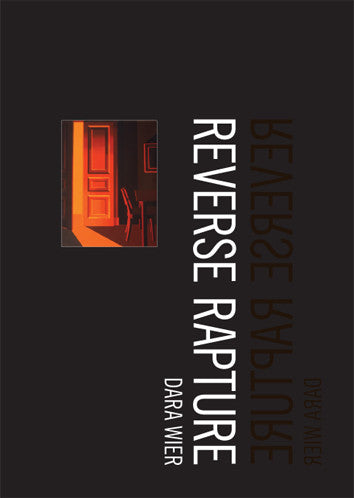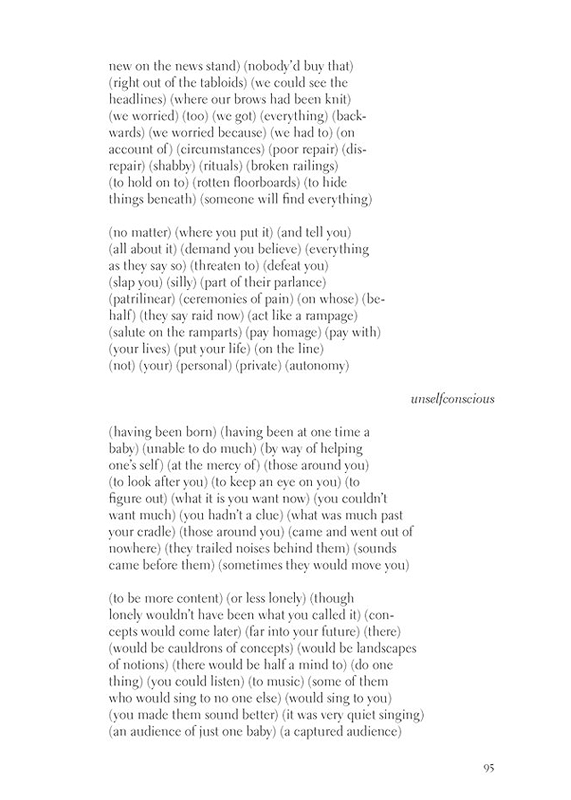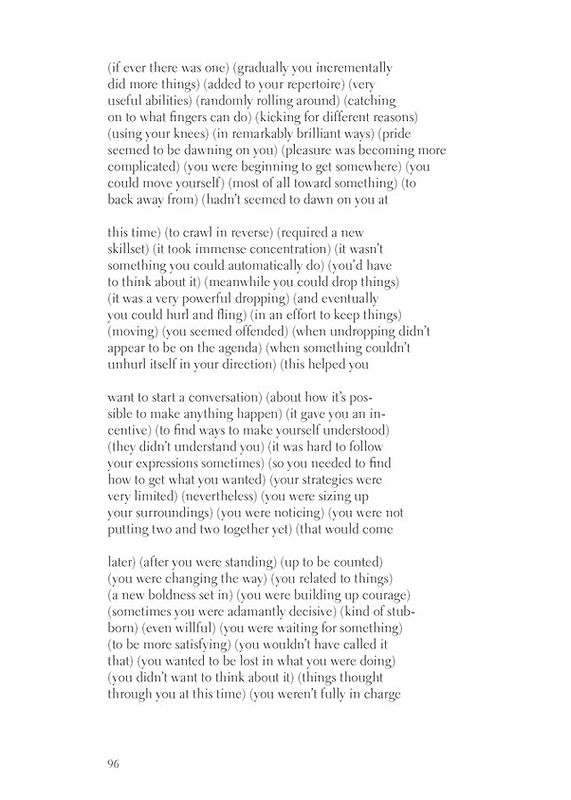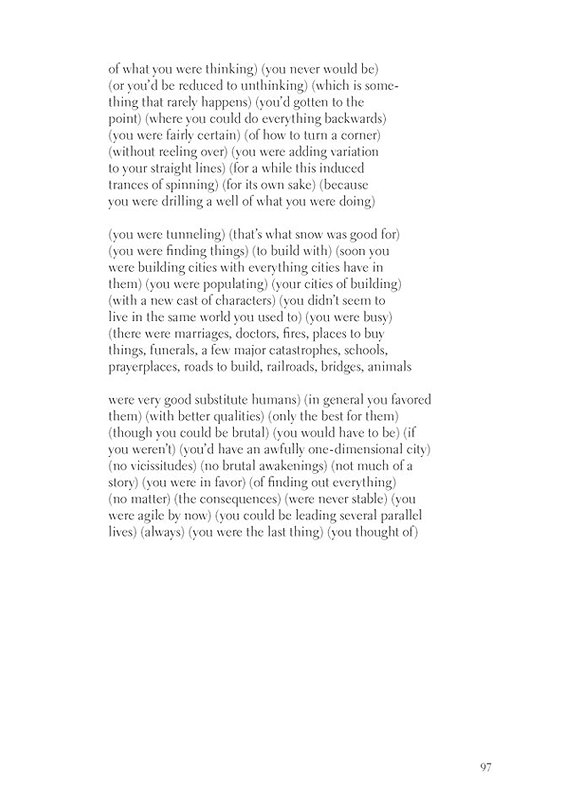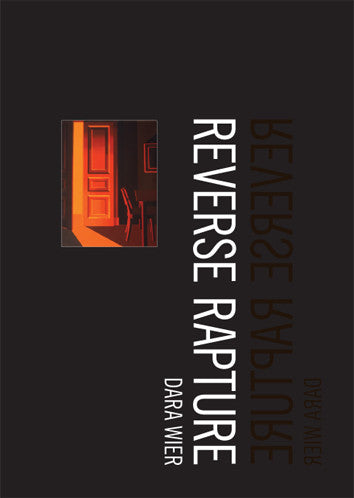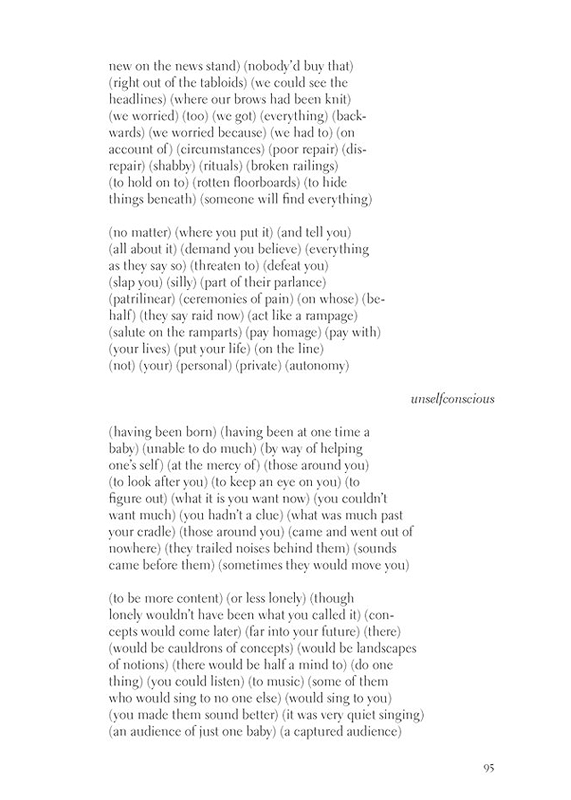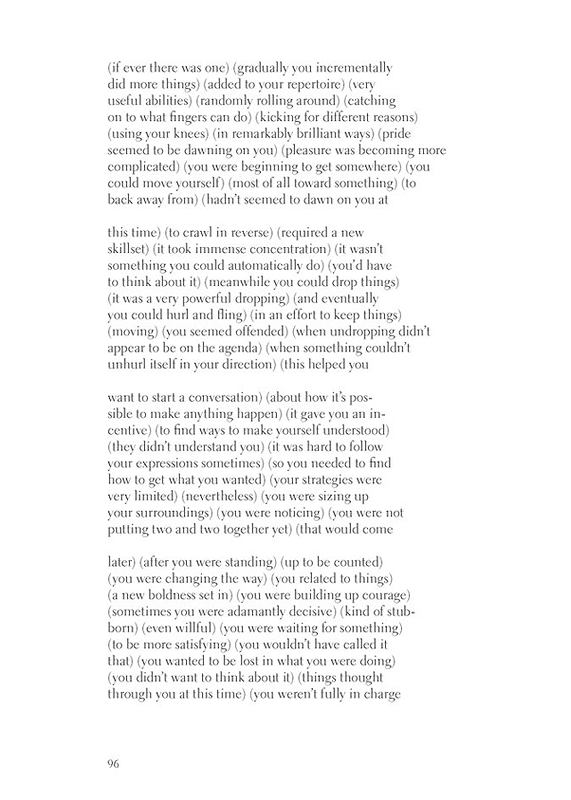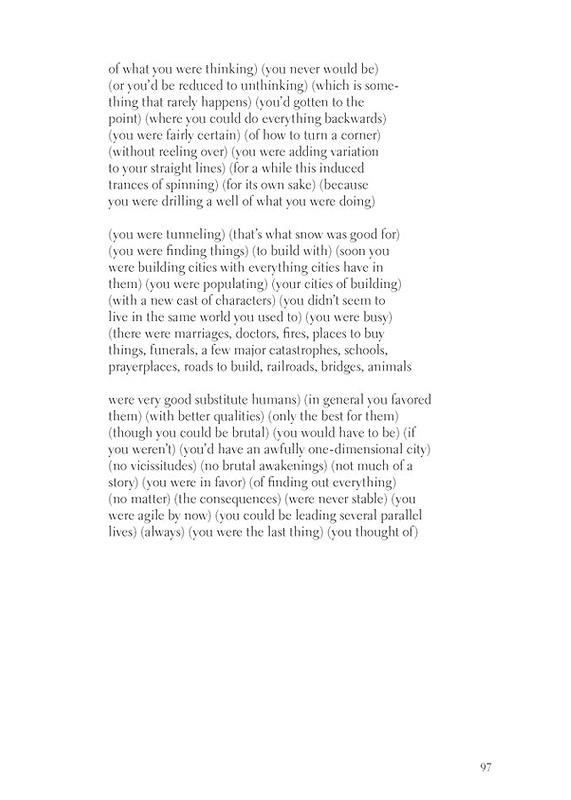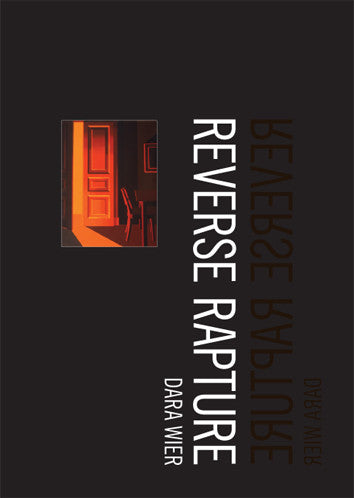
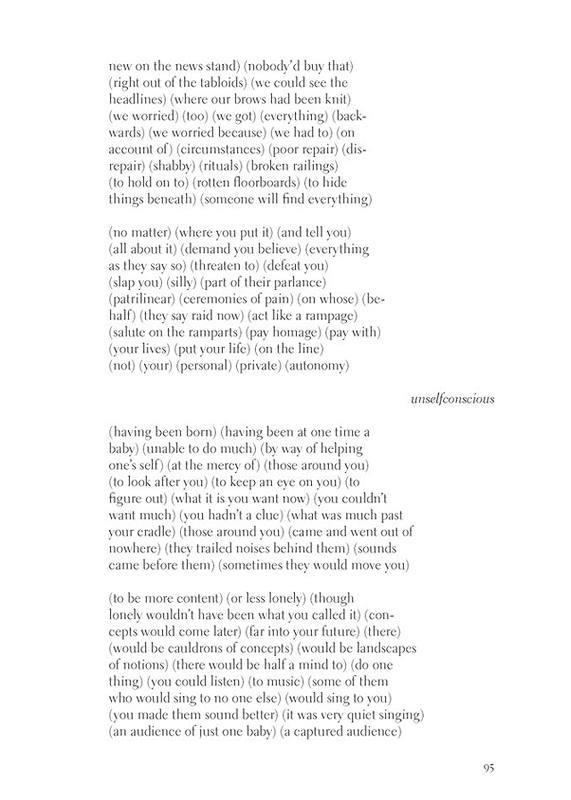
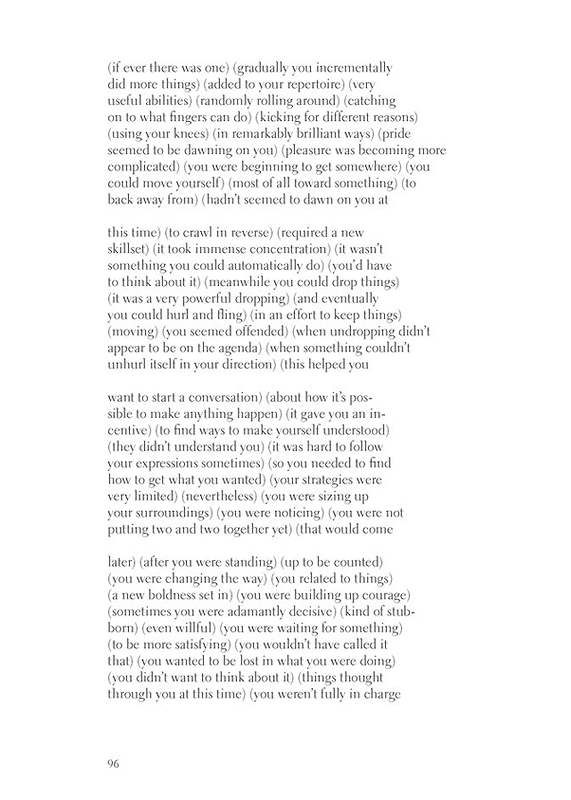
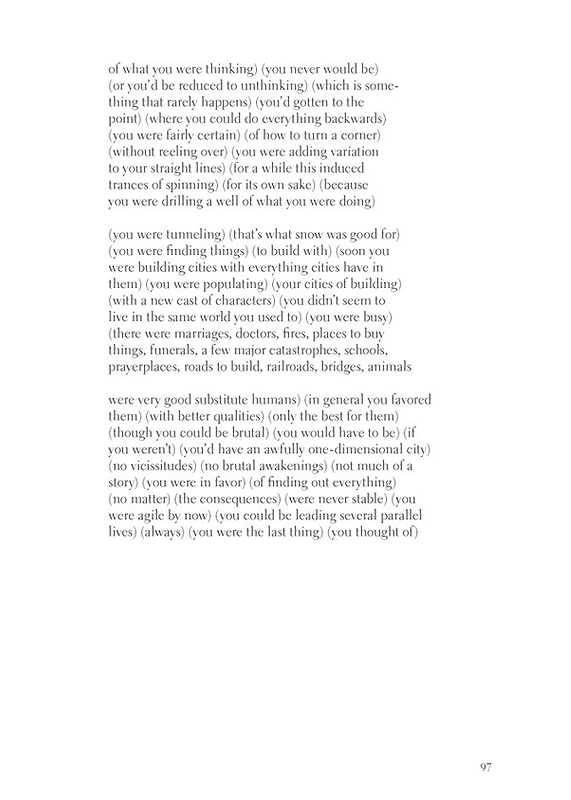
Dara Barrois/Dixon (née Dara Wier)
Reverse Rapture
Reverse Rapture
By Dara Barrois/Dixon (née Dara Wier)
-
(we were subterranean then) (it lasted a long time)
(you wore a jacklight) (like a third eye)
Reverse Rapture is an intimate epic of memory, hope, and questioning. A band of explorers sifts through the artifacts and sensations of our times, all the while listening to and taking care of one another. In awe of everything, they, and the poems that recount their adventures, create a gorgeous web of lyric possibility.
Winner of the 2006 SFSU Poetry Center Book Award -
What a masterful performance Dara Wier presents in Reverse Rapture!... Wier’s parentheses are placed side by side—aside by aside—on the same level of attention, like a stone skipping unendingly across a lake. The text is suspenseful and engaging, random yet within a range of expectation set up by a prologue that reads like an archaeologist’s report on a newly uncovered civilization. Lost to us already, these people speak by telepathic choruses of linked or scattered statements, descriptions, and reactions.... Wier’s poems explode with variety, particularity, whirlwinds of detail and mystery, shrinkwrapped though they are: memoirs, dialogues, choral performances witnessing scenes both weird and familiar... the halfmoons curving around each phrase permit a surprising immediacy, abutment of image and sound that heightens the surreality of Wier’s juxtapositions.
Rosanne Wasserman, Rain Taxi
Wier’s tone is conspiratorial, intimate, and conversational; there is the urgency of a conversion experience in the making. The speaker will save you from yourself one way or another, but it won’t be in order to spill the beans of a particular cultish belief on your lap. You’re going to have to work harder than that to find your own meanings, make your own rituals—and your own fun. This litany just keeps rolling toward you, as the poet employs an unending list(ing) effect.
Cathryn Hankla, Hollins Critic
Like Seurat’s Grand Jatte, Roussel’s Nouvelles Impressions d’Afrique and Stein’s Stanzas in Meditation, Dara Wier’s Reverse Rapture is a mosaic whose colossal proportions contradict the mundane character of its countless self-contained tesserae. It may not be for the faint of heart—most intense experiences aren’t—but those who stay with it will find themselves face to face with a world whose eerily sharp focus suggests recent satellite photographs of Mars. And they will never be the same again.
John Ashbery -
“Notes on Reverse Rapture” by Dara Wier
I ran across Breton’s Mad Love and started reading its first paragraph. What arrested my attention is this part:
These characters habitually appear to me dressed in black probably in full dress; their faces escape me, but I think there are seven or so of them, seated next to each other on a bench, talking among themselves, always looking straight ahead. That is the way I should have liked to put them on stage in the play's opening scene, their role being to unveil, with a certain cynicism, the motives for the action. At nightfall and often much later (I know perfectly well that psychoanalysis would have something to say about this), as if they were submitting to a ritual, I find them wandering speechless by the sea, in single file, winding lightly around the waves. Coming from them, the silence is no hardship, their conversation on that bench always having seemed to me, to tell the truth, singularly disconnected.
This is pretty much one way I’d pictured a staged reading of Reverse Rapture.
Not in its entirety, but rather in a newly arranged scripting.
Another way is I’ve pictured actors standing in changing fluid arrangements, none of them ever fully visible even while overhead spots attempt to illuminate them as they speak, but the spots always miss their mark, maybe occasionally glancing on just a part of a face, or a hand, or the back of someone's head, the spots would need to be not glaring ones, they'd need to be filtered, a good lighting choreographer would need to play this dance of lights out, it would need to mostly be subtle, though now and then, it could “take over” and voices might shift into a quieter range...voice ranges, likewise, would need to be lowered and raised in some rhythmical sequences, there might now and then be some echoes. A score would need to be as integral as lighting and words. Textured.
I think it should take no more than about 27 minutes.
I think of the book as a river. You don't need to start at the source or headwater, nor do you need to view the mouth of the river as any kind of cut and dry conclusion or location. I think the book can be read in pieces, not insistently chronological, I think it can be dipped in and out of.
When I was writing Reverse Rapture I eventually found that I loved these characters. It became more and more evident they were in terribly difficult and sometimes extremely dangerous territories. They were in strange circumstances, traveling together, I don't think they knew where they were going and so by necessity they had to be always moving. I thought, after a while, of them keeping the conversation going because they had to, to keep one another alive. Maybe it is a little like how it feels to be in a room suddenly darkened because electricity’s failed and no one seems to be finding a candle or flashlight or jacklight or strobe or klieg lights. I think of children, and occasionally adults, who are together after lights out, how affecting voices coming out of darkness will register. I suppose during WWII, where there were blackouts, conversations continued. I wrote the book while the Iraq war was in its early stages. I wrote in an atmosphere during which rumors and confusion were rampant, during a time when authority's main purpose seemed to be to keep us in fear. And often to deceive us. The characters in Reverse Rapture are influenced by this time.
While whistling in the dark doesn’t exactly compare to what's going on in Reverse Rapture, there is in the book an aspect of at times keeping something at bay, at times being on the run, away from something threatening. I think they sometimes talk to give one another some comfort, sometimes to change the subject, sometimes to address their circumstances directly, sometimes to pass the time, sometimes because their love of one another leads them to have something inflected by love on their minds.
The book’s form, sections of 9-line, 9-stanza sequences was determined from the start. I like the number 9, I like that 81 can be converted to 9. I like odd numbers. The poem needed a rhythm of form so that its interior could be my focus.
Parentheses are timing devices. And, to a degree, syntax busters. Conventional punctuation would have left the words less overheard and more written. In the section subtitled “nothing matches,” things seem to have gotten a little out of hand, as if perhaps everyone (characters in the poem overwhelmingly guiding my hand) decided to play these choices out in extreme.
Many, though not all, of the epigraphs that run the length of the poem are from long or booklength poems or, in one case, a book that’s a diary of a journey into territory before unknown to the log-keeper. Emily Dickinson’s tombstone engraving [“called back”] couldn’t be resisted as it speaks directly to the poem’s title. I wanted to include others because in one way or another they call into the poem’s pages books I’ve found to be mysteriously beautiful and deeply touching. I hope their appearances layer in other sets of possibilities.
The book’s prologue is the last piece I wrote. When I wrote it I didn’t know I was writing the book’s prologue and surely this was a lucky accident. [Verse Press’ editor] Lori Shine had asked me to proof her always carefully copyedited manuscript of Reverse Rapture. I did as she asked. When that job was done, later in the day I started writing what I thought at the time was a “new” poem. It wasn’t until the next morning it dawned on me what I’d written was Reverse Rapture’s prologue. I sent it to Lori Shine and Matthew Zapruder (then Verse, now Wave editor). They thought so too.
Shocking. Surely, the prologue came directly out of the time I’d spent proofing Reverse Rapture. It’s good that I didn’t know it while it was happening, for surely that knowledge would have stopped me in my tracks, frozen with destabilizing self-consciousness. If someone had said that the book needed a prologue, I would have been at a loss. Lucky, yes, and a good thing, too, that the prologue is there.
While writing Reverse Rapture I wrote many more sections than are included in the book as it stands. Matthew Zapruder and Lori Shine were most gentle and discrete and acutely helpful in guiding me as they and I proposed which sections to cut. This was not painful. It was strangely exhilarating. At some point we talked about putting some out-takes on the press website.Down the passage which we did not take Towards the door we never opened —T. S. Eliot *
fire sale
(it was a young one) (you could still see its
softspot) (it was pulsing)
(it was curious watching it) (all of its feelings
were always colliding) (you could see them overtake
one another and blend in) (even when it was sleeping)
(what was it thinking about) (how was it feeling)
(it was born with a veil over its face) (that’s why
they didn’t want it)
(back then we were all creoles) (that’s what they called us)
(we carried umbrellas)
(is there a way we can put one together)
(keep those hubcaps) (we can use them for mirrors)
(if we need to we can fill them with water)
(they could be soup bowls) (they could be basins)
(that’s what they told us) (they sawed through the
crowns) (right through their foreheads) (they were
this shallow) (they couldn’t hold very much of any-
thing) (we didn’t buy one) (do you have your sling-
shot) (it was the place they went to buy jackets)
(I can hear something rustling around in the smoke
trees) (see if you can hit that silo from here)
(it might distract them) (we’ll take the first street-
car we see) (now turn yourself into palmetto)
(maybe you can be a basket of chopsticks) (what about
a drawer full of steak knives) (remember when you were
a snare drum) (timpani aren’t for sissies) (then be
any kind of kettledrum you want to)
(how will we get past the tollgate)
(let me have one of the tipsheets) (the one we found
in the bottle that time we slept by the river)
(you said it was a circle of confusion) (you said it
was cock-eyed) (you called it a stormy petrel) (you
said it was classified)
(that is not it) (that is the nuque of your neck)
(then get out some tea leaves) (go find some entrails)
(how about the sock filled with marbles)
(they were siphoning) (they weren’t ciphering) (not
then they weren’t)
(they needed diesel fuel) (that’s how they got it)
(remember how it clashed) (it was foxy)
(you said it was some kind of con game)
(it was just some subfamily)
(it wasn’t meek) (it caused a lot of turbulence in
the morass) (that was its aptitude)
(so derange it)
(go whack some bush) (if you’re so anxious)
(you know what they say about patience)
(then loan me some sandpaper) (I’ll just sit here)
(the ones we found tied up outside the cathedral)
(didn’t work out) (they’d been housetrained)
(you can play it back) (it was recorded)
(those are the ones whose fingerprints we found
on magnolias)
(maybe it was gardenias)
(anyway) (it smacked of skullduggery)
(they’d stuck skull & dagger stickers on every-
thing) (everywhere they went)
(it ruined the scenery)
(they asked too many questions we couldn’t answer)
(they came around collecting samples of our tapwater)
(one of them offered to give us prayer lessons)
(it was going to help them meet some kind of quota)
(they never asked for a quorum)
(that old seamless gown) (whatever happened with it)
(what seamless gown)
(the one we found on the tugboat) (it was a stormy
night)
(it was frigorific) (like good time lapse)
(it was a straight shooter) (like a ventriloquist)
(they said it was mandatory)
(they looked bad) (they had mange)
(it was their gravy train) (they said they owned it)
(they docked everything they could dock)
(it’s burned pretty bad but you can still tell it’s
a jacket) (that's a chevron) (that's a fishhook)
(that’s somebody’s hatchet job) (that's a plotline)
(there’s a barrel full of tridents) (you can take one)
(in its own way it’s tintinabular) (at least sometimes)
(what’s the longest time you ever listened to bells
toll) (they were big bells) (we were hypnotized) (when we
found them the carrier pigeons’ eyes had been sewn closed)
Publication Date: April 1, 2005
ISBN# 9780974635347 (6x9 152pp, paperback)
Couldn't load pickup availability
